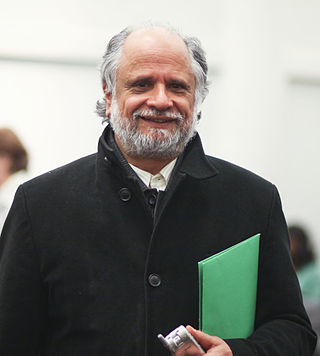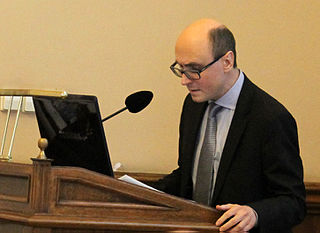Related Research Articles

Literary theory is the systematic study of the nature of literature and of the methods for literary analysis. Since the 19th century, literary scholarship includes literary theory and considerations of intellectual history, moral philosophy, social philosophy, and interdisciplinary themes relevant to how people interpret meaning. In the humanities in modern academia, the latter style of literary scholarship is an offshoot of post-structuralism. Consequently, the word theory became an umbrella term for scholarly approaches to reading texts, some of which are informed by strands of semiotics, cultural studies, philosophy of language, and continental philosophy.

Raymond Henry Williams was a Welsh socialist writer, academic, novelist and critic influential within the New Left and in wider culture. His writings on politics, culture, the media and literature contributed to the Marxist critique of culture and the arts. Some 750,000 copies of his books were sold in UK editions alone, and there are many translations available. His work laid foundations for the field of cultural studies and cultural materialism.

An academic discipline or field of study is a branch of knowledge, taught and researched as part of higher education. A scholar's discipline is commonly defined by the university faculties and learned societies to which they belong and the academic journals in which they publish research.

Fredric Jameson is an American literary critic, philosopher and Marxist political theorist. He is best known for his analysis of contemporary cultural trends, particularly his analysis of postmodernity and capitalism. Jameson's best-known books include Postmodernism, or, The Cultural Logic of Late Capitalism (1991) and The Political Unconscious (1981).

Homi Kharshedji Bhabha is an Indian scholar and critical theorist. He is the Anne F. Rothenberg Professor of the Humanities at Harvard University. He is one of the most important figures in contemporary postcolonial studies, and has developed a number of the field's neologisms and key concepts, such as hybridity, mimicry, difference, and ambivalence. Such terms describe ways in which colonised people have resisted the power of the coloniser, according to Bhabha's theory. In 2012, he received the Padma Bhushan award in the field of literature and education from the Indian government. He is married to attorney and Harvard lecturer Jacqueline Bhabha, and they have three children.
Michael Bérubé is Edwin Erle Sparks Professor of Literature at Pennsylvania State University, where he teaches American literature, disability studies, and cultural studies. He is the author of several books on cultural studies, disability rights, liberal and conservative politics, and debates in higher education. From 2010 to 2017, he was the Director of the Institute for the Arts and Humanities at Penn State; from 1997 to 2001 he was the founding director of the Illinois Program for Research in the Humanities. He was the 2012 president of the Modern Language Association, and served as vice president from 2010–2011. He served two terms on the National Council of the American Association of University Professors from 2005 to 2011, and three terms on the AAUP's Committee A on Academic Freedom and Tenure from 2009 to 2018. He was a member of the International Advisory Board of the Consortium of Humanities Centers and Institutes for two terms, 2011-2017. Bérubé was named a University Scholar for research at the University of Illinois in 1995 and was awarded the Faculty Scholar medal for research from Penn State in 2012.
Graeme Turner is an Australian professor of cultural studies and an Emeritus Professor at the University of Queensland. During his institutional academic career he was a Federation Fellow, a President of the Australian Academy of the Humanities, founding Director of the Centre for Critical and Cultural Studies at the University of Queensland, and Convenor of the ARC Cultural Research Network.

Arif Dirlik was a Turkish-American historian who published on historiography and political ideology in modern China, as well as issues in modernity, globalization, and postcolonial criticism. Dirlik received a BSc in Electrical Engineering at Robert College, Istanbul in 1964 and a PhD in History at the University of Rochester in 1973.
John Frow is an Australian writer of literary theory, narrative theory, intellectual property law, and cultural studies. He is currently a professor of English at the University of Sydney.
Peggy Levitt is the Mildred Lane Kemper Chair of Sociology at Wellesley College and a co-founder of the Global (De)Centre. Her latest book, Transnational Social Protection: Social Welfare Across National Borders was published by Oxford University Press in 2023. Her current book project, Move Over, Mona Lisa. Move Over, Jane Eyre: Making the World’s Universities, Museums, and Libraries More Welcoming to Everyone will be published by Stanford University Press. Peggy writes regularly about globalization, arts and culture, immigration, and religion.
The Unit for Criticism and Interpretive Theory is an interdisciplinary program developed within the Graduate College and the College of Liberal Arts and Sciences at the University of Illinois at Urbana-Champaign. It works to promote conversations among a range of departments in the humanities, social sciences, and performing arts by organizing lectures, panel discussions, and conferences, as well as a yearly series of lectures on Modern Critical Theory. The unit is one of several dozen centers around the world devoted to critical theory, and was one of the first to be formally established.
Cultural studies is a politically engaged postdisciplinary academic field that explores the dynamics of especially contemporary culture and its social and historical foundations. Cultural studies researchers generally investigate how cultural practices relate to wider systems of power associated with, or operating through, social phenomena. These include ideology, class structures, national formations, ethnicity, sexual orientation, gender, and generation. Employing cultural analysis, cultural studies views cultures not as fixed, bounded, stable, and discrete entities, but rather as constantly interacting and changing sets of practices and processes. The field of cultural studies encompasses a range of theoretical and methodological perspectives and practices. Although distinct from the discipline of cultural anthropology and the interdisciplinary field of ethnic studies, cultural studies draws upon and has contributed to each of these fields.
Claire Colebrook, is an Australian cultural theorist, currently appointed Edwin Erle Sparks Professor of English at Pennsylvania State University. She has published numerous works on Gilles Deleuze, visual art, poetry, queer theory, film studies, contemporary literature, theory, cultural studies and visual culture. She is the editor of the Critical Climate Change Book Series at Open Humanities Press.
Neo-Marxism is a collection of Marxist schools of thought originating from 20th-century approaches to amend or extend Marxism and Marxist theory, typically by incorporating elements from other intellectual traditions such as critical theory, psychoanalysis, or existentialism. Neo-Marxism comes under the broader framework of the New Left. In a sociological sense, neo-Marxism adds Max Weber's broader understanding of social inequality, such as status and power, to Marxist philosophy.
Fiona Devine CBE FAcSS is a professor of sociology at the University of Manchester and Vice-President and Dean of the Faculty of Humanities at the University of Manchester.

Anatoly Rykov is a Russian art and political theorist, art historian, and professor at Saint Petersburg State University. In his numerous writings, Professor Rykov argues that leftist projects in art and culture often employ repressive and totalitarian concepts and metaphors. He introduced the notion of “radical conservatism” in order to explain this phenomenon in the theoretical matrix of the avant-garde and its postmodern interpretation. He has written on a range of subjects in Renaissance, 18th, 19th and 20th century art.
Vijay Chandra Mishra is an academic, author and cultural theorist from Fiji. He is currently a professor at Murdoch University, Australia.
Susan Laura Mizruchi is professor of English literature and the William Arrowsmith Professor in the Humanities at Boston University. Her research interests include nineteenth- and twentieth-century American literature, religion and culture, literary and social theory, literary history, history of the social sciences, and American and Global Film and TV. Since 2016, she has served as the director of the Boston University Center for the Humanities.
Marxist cultural analysis is a form of cultural analysis and anti-capitalist cultural critique, which assumes the theory of cultural hegemony and from this specifically targets those aspects of culture which are profit driven and mass-produced under capitalism.
Ranjan Ghosh is an Indian academic and thinker who teaches at the Department of English, University of North Bengal, India. His wide-ranging scholarly work spans across the fields of comparative literature, comparative philosophy, philosophy of education, environmental humanities, critical and cultural theory, and Intellectual history. He has been an Alexander von Humboldt Fellow.
References
- 1 2 3 4 5 6 "Profile - Asia in Transition: Representation and Identity: The Japan Foundation 30th Anniversary International Symposium 2002", retrieved 4 October 2020.
- 1 2 3 4 5 6 7 8 9 10 "Professor Tony Bennett", Institute for Culture and Society, Western Sydney University, retrieved 4 October 2020.
- 1 2 3 4 5 6 "Prof Tony Bennett: Visiting Research Professor, Sociology", The Open University, archived from the original on 23 June 2011.
- 1 2 Ian Robert Lamond, "Putting policy at the centre of cultural policy studies", conference paper, ICCPR 2010, University of Jyväskylä, July 2010.
- ↑ Jonathan Sterne, "Cultural Policy Studies and the Problem of Political Representation", The Communication Review 5 (2002) 59–89, doi : 10.1080/10714420212351.
- 1 2 George Yúdice, "Introduction", Social Text 59 (Summer 1999) 1–4.
- 1 2 Brandon Woolf, "Putting Policy into Performance Studies?", Performance Research 20.4 (2015) 104–11, doi : 10.1080/13528165.2015.1071047.
- ↑ Barbara Foley, "Review, Formalism and Marxism. Tony Bennett", Modern Philology 80.4 (May 1983) 443–, doi : 10.1086/391261.
- ↑ Graham Pechey, "Formalism and Marxism. Review: The Formal Method in Literary Scholarship: A Critical Introduction to Sociological Poetics by P.N. Medvedev, M.M. Bakhtin; Formalism and Marxism by Tony Bennett", Oxford Literary Review 4.2 (1980) 72–81.
- ↑ William E. Cain, "Review: Outside Literature, by Tony Bennett", Philosophy and Literature 15.2 (October 1991) 343–44, doi : 10.1353/phl.1991.0043.
- ↑ David Simpson, "Review: Outside Literature. By Tony Bennett", Comparative Literature Studies 30.3 (1993) 315–21.
- ↑ Thomas Prasch, "Review: The Birth of the Museum: History, Theory, Politics, by Tony Bennett", Victorian Studies 40.3 (Spring 1997) 509–11.
- ↑ Thomas F. Soapes, "Review: The Birth of the Museum: History, Theory, Politics. By Tony Bennett", The Library Quarterly 67.1 (January 1997) 78–, doi : 10.1086/629913.
- ↑ Liz Jacka, "Review: Bennett, Tony, Culture: A Reformer's Science", Media International Australia incorporating Culture and Policy, 89.1 (November 1998) 138–40, doi : 10.1177/1329878X9808900114.
- ↑ Lisanne Gibson, "Review essay: Tony Bennett, Culture: a reformer's science", International Journal of Cultural Policy 16.1 (2010) 29–31, doi : 10.1080/10286630902785631.
- ↑ Tom Burvill, "Review of Culture in Australia – Policies, Publics, and Programs, edited by Tony Bennett and David Carter", Australian Humanities Review 25, March 2002.
- ↑ Maria Desougi, "Review: Understanding Everyday Life, Bennett, Tony and Diane Watson (Editors)", Sociological Research Online, October 2003.